Funeral directors refuse to transport Alexei Navalny’s corpse from morgue after receiving anonymous threats
Hearse drivers are now refusing to take the body of Russian opposition politician Alexei Navalny from the morgue to his funeral on Friday after receiving threats from unknown individuals, his allies said today.
Since the Kremlin critic’s death in prison almost two weeks ago, his team has accused authorities of trying to prevent him from receiving a dignified public funeral.
“What a shame,” said Ivan Zhdanov, an exiled ally who headed Navalny’s Anti-Corruption Foundation.
“Now the hearse drivers are refusing to take Alexei from the morgue.”
Navalny’s spokeswoman Kira Yarmysh said that funeral directors had received threatening phone calls from “unknown people” warning them not to transport Navalny’s body anywhere, and that no one had agreed to transport his body as a result.
The funeral and farewell ceremony of Russian opposition leader Alexei Navalny will take place in Moscow on Friday, his spokesman said.
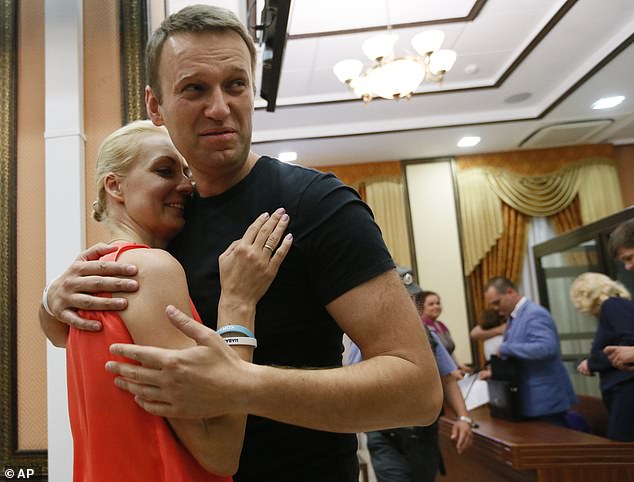
Russian opposition leader Alexei Navalny, right, hugs his wife Yulia as he was released by a court in Kirov, Russia, July 19, 2013
Zhdanov said Navalny’s team would manage and find a solution anyway.
Navalny died two weeks ago on February 16 in one of Russia’s toughest prisons in northern Siberia, known as ‘Polar Wolf’.
There he served a 19-year prison sentence on charges widely seen as political retaliation for his staunch opposition to Vladimir Putin’s regime.
Authorities resisted handing over the politician’s body to his family for eight days. According to his team, this was an attempt to ‘cover up’ official involvement in his death.
Russian authorities said Navalny died of “natural causes,” but his team and some Western leaders have accused Putin of being directly responsible.
Navalny’s body was eventually released to his mother, but the Kremlin critic’s allies have since accused Russian authorities of blocking a civilian memorial service they planned to hold for him to prevent possible protests or dissent against Putin.
The Kremlin has said it has nothing to do with such arrangements.
The late dissident’s allies announced on Wednesday that he will be buried in the Russian capital on Friday after a church service in the southeastern suburb where he used to live. Navalny’s allies have promised to livestream his funeral service online.
However, details about the opposition leader’s funeral and how many mourners will attend are still unclear, with no comment from authorities on how it will be managed.
On Thursday, Navalny’s allies called on people who wanted to honor his memory but could not attend his funeral service to instead visit certain landmarks in their own city on Friday evening at 7pm local time.
Judging from previous gatherings of Navalny supporters – who have been labeled by Russian authorities as US-backed extremists – a heavy police presence is likely.
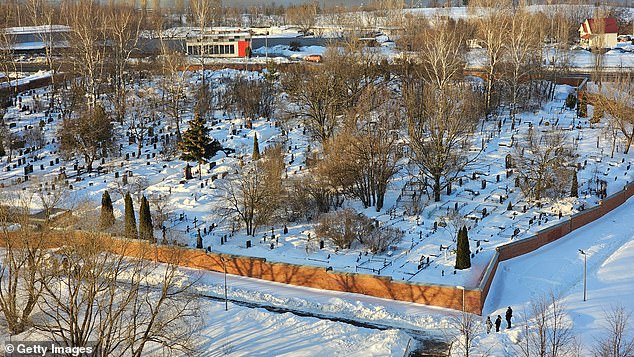
Russian police officers guard the area near the fence of the Borisov cemetery where Alexei Navalny is expected to be buried this week, on February 27, in Moscow.
Russian authorities will break up anything they think looks like a political demonstration under protest laws.
Navalny’s wife Yulia Navalnaya, 47, has said she is unsure whether the funeral itself will be peaceful or whether police will arrest those attending.
“I am not yet sure whether it will be peaceful or whether the police will arrest those who come to say goodbye to my husband,” Navalnaya said on Wednesday.
Navalny’s team said in a social media post that a funeral service would be held at the Mother of God Quench My Sorrows Church in Maryino on March 1 at 2 p.m. (11 a.m. GMT). “Come in advance,” the post said.
The funeral of the opposition leader, who had embraced Christianity, will take place at Borisov’s cemetery, a short walk from the banks of the Moskva River.
Finding a church willing to host the service was also difficult, the team said, because the Kremlin was concerned that a public funeral could turn into a show of support for Navalny.
‘We started looking for a church and a hall for March 1. Everywhere they refused to give us anything. In some places we were told it was forbidden,” exiled ally Ivan Zhdanov said. Other allies said they were denied places after hearing Navalny’s name.
“Alexei needs to be buried… To have a chance to say goodbye, it’s better to come in advance,” he added.
Authorities had threatened to bury him on the prison grounds where he died unless his family agreed to a private ceremony, his team said earlier.
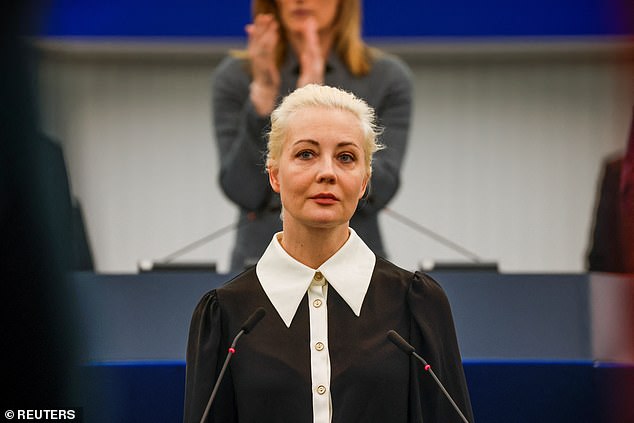
Yulia Navalnaya (pictured), 47, said yesterday that her late husband’s body had been abused and that she was unsure whether his funeral on Friday would be a peaceful event or whether police would make arrests.
Navalny’s allies have accused President Vladimir Putin of having him killed because the Russian leader could not tolerate the thought of Navalny being released as part of a possible prisoner swap.
They have not published any evidence to support that accusation, but have promised to detail how he was killed and by whom.
The Kremlin has denied state involvement in his death and said it was not aware of any deal to free Navalny.
His death certificate stated – according to allies – that he died of “natural causes” after losing consciousness following a walk in his prison colony in the Arctic.
That claim has been rejected by Navalny’s family, supporters and Western officials.
Meanwhile, the European Parliament said on Thursday that Putin bears “criminal and political responsibility” for Navalny’s and must be held accountable.
“The Russian government and Vladimir Putin personally bear criminal and political responsibility for the death of their most prominent opponent, Alexei Navalny,” parliament said in a resolution passed by 506 votes in the 705-seat assembly.
Putin “must be held accountable,” the report said.
Only nine lawmakers voted against the resolution.
The lawmakers also called for an “independent and transparent international investigation” into the circumstances of Navalny’s death.
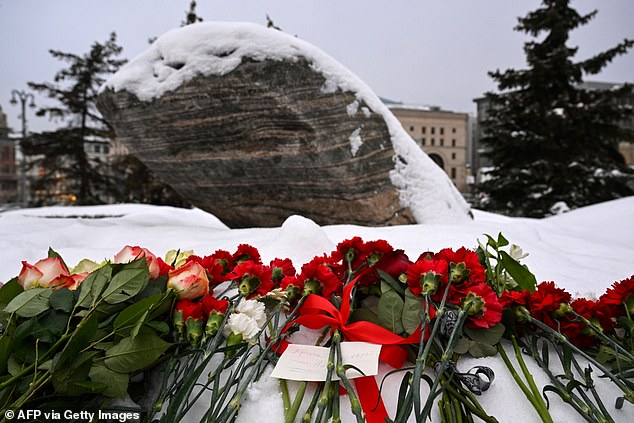
A paper note that says ‘Hello. This is Navalny’ is seen among the flowers left for the late Russian opposition leader Alexei Navalny at the Solovetsky Stone, a monument to political repression that has become one of the places for tributes to Navalny, in Moscow on February 23
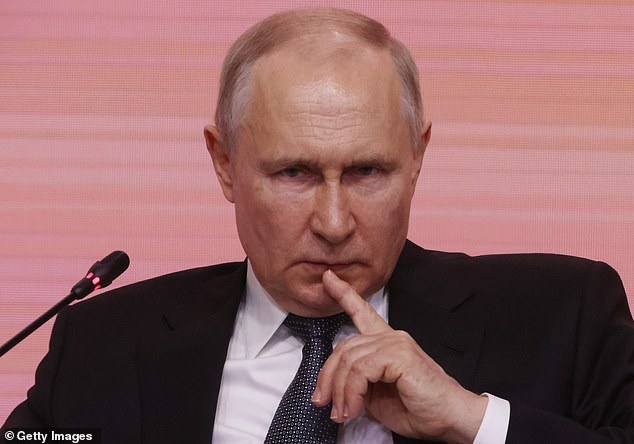
The West and Navalny’s supporters, including his widow, say Russian President Vladimir Putin (pictured) is responsible for Navalny’s death
In addition, parliament asked EU members to ‘intensify’ support for Russian political prisoners and to continue supporting the democratic opposition in Russia.
Yulia Navalnaya said in the European Parliament on Wednesday that her husband’s body was abused after his death in the Arctic gulag.
She also warned about Putin, whom she accused of having her husband killed: “You are not dealing with a politician, but with a bloody monster.”
The opposition leader rose to prominence for his campaign against corruption, which he said was widespread at the top of Putin’s government.
Navalny was arrested in January 2021 when he returned to Russia after being treated in Germany for a poisoning attack he suffered during his campaign against Putin.
Later that year he received the EU’s highest law award, the Sakharov Prize.
